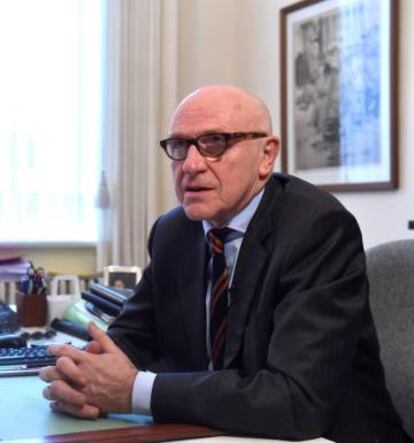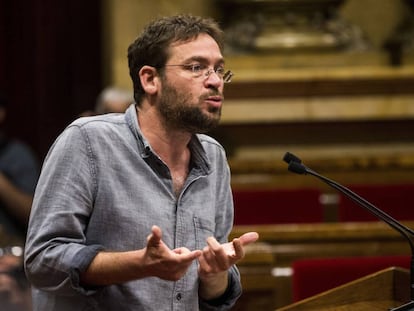What happens now that Puigdemont has refused to appear in court?
European Arrest Warrant could be issued for former regional premier of Catalonia, currently in Brussels


The former premier of Catalonia, Carles Puigdemont, is currently in Brussels and has announced he will not return to Spain until he has ¡°guarantees¡± of a fair trial.¡± His lawyer in Belgium, Paul Bekaert, who has represented various members of the Basque terrorist organization ETA, stated on Wednesday that Puigdemont would not appear in the Spanish High Court and that his strategy would focus on fighting any attempts at extradition.
The sacked Catalan government confirmed later on Wednesday that the former premier, as well as four of his former Cabinet members who are with him in Belgium, would not honor the High Court summons.
Puigdemont and 13 members of his government were summoned to appear in the High Court on Thursday and Friday, facing possible charges of rebellion, sedition and misappropriate of public funds.
But Puigdemont, as well as former members of the Catalan Cabinet Meritxell Borr¨¤s, Antoni Com¨ªn, Clara Ponsat¨ª and Meritxell Serret, failed to appear. So what happens next?

Ongoing cases
1) In the High Court, Judge Carmen Lamela has accepted the formal accusation of rebellion filed by the Spanish public prosecutor¡¯s office against Puigdemont and 13 members of his former cabinet. The crime carries a possible sentence of 30 years in prison.
2) The former president is also being investigated by the Catalan High Court (TSJC) for disobedience, misusing public funds and making deliberately unlawful decisions as elected officials (known in Spanish as prevaricaci¨®n).
A European Arrest Warrant?
1) Now that Puigdemont has failed to appear in the High Court, Judge Lamela could draw up a writ ordering hm to be taken into custody.
2) Once this writ has been produced, Spanish judges can issue a European Arrest Warrant (EAW) ¨C the European Union equivalent of the old extradition orders. Prosecutors must make a request for this arrest warrant to be issued.
3) This EAW would be handed over by the judge to the Spanish National Police, who will use the SIRENE office ¨C part of the EU¡¯s Schengen Information System ¨C to transmit the warrant to Belgian police.

4) This mechanism entails the arrest of the individual named in the warrant. A Belgian judge would then be tasked with looking at the handover of that person to Spain. The EAW protocol has been in place in Spain since 2003 and was updated in 2014, partly to include the requirement that the initial request for the warrant comes from prosecutors (previously judges were able to draw up an EAW without involving prosecutors in the process). It was also updated to include the principle of proportionality, meaning that an EAW can only be issued when Spain believes the conditions for pre-trial custody exist in the case of the person named in the warrant.
EAWs are carried out between judges of different EU members states, and, as a point of difference with extradition orders, the governments of the relevant countries are not involved.
5) EAWs are regulated in Spanish legislation under Law 23 of 2014 covering the mutual recognition of penal resolutions in the EU. This rule imposes on Spain the obligation to comply with other EU legislation including a 2002 agreement on making the handover of detainees easier.
6. The procedure is fairly straightforward, on paper at least. The judicial system in the country notified usually agrees to the handover of the person named in the warrant in around 60 days.
Possible obstacles
There are, however, a number of legal avenues that can extend these time frames, according to judicial sources consulted by this paper.
1) This handover could take longer if the judge ordering the EAW has not exhausted all other possible means of questioning the suspect, including via video conference. However, in the case of crimes as serious of rebellion ¨C as is the case with former Catalan premier Puigdemont ¨C this excuse would carry little weight, according to judicial sources.
Why has Puigdemont asked to speak to the courts from Brussels?
The lawyer for deposed Catalan premier Carles Puigdemont has said his client intends to speak to the Spanish courts from the Belgian capital via videolink. Although both the former regional premier and his lawyer have said he does not intend to apply for asylum in Belgium, both of waiting to see what action the Spanish justice system takes next. The four former members of the Catalan cabinet still in Belgium ¨C Meritxell Borr¨¤s, Antoni Com¨ªn, Clara Ponsat¨ª and Meritxell Serret ¨C have also asked to make their statements via? videolink. They have the same goal: to draw out proceedings and approach the regional elections of December 21 with all options open to the self-professed legitimate Catalan ¡°government in exile¡± now on the run in Belgium.
2) Another hurdle thwarting a rapid handover could be the fact that rebellion is not on the list of 32 crimes that are exempt, under European law, from ¡°double classification.¡± In other words the crime of rebellion is on the books in both countries. Under Belgian law, rebellion has a slightly different definition from that of Spanish law, according to sources consulted. And even in Spain, the crime is not very well-defined. This could lead to Belgian judges to make an argument that they need to look closely at the subject in question and examine whether, under Belgian law, Puigdemont and fellow members of his government currently in Belgium are actually liable to prosecution. If a judge agrees to the handover of the detainees, those detainees could then appeal.
3) Although the simplified EAW system is based on ¡°an elevated level of confidence¡± between EU member states, and on the fact that judicial resolutions in one country will be recognized by others, people named in these warrants can claim ¨C and everything suggests Puigdemont will do this ¨C that they are afraid their fundamental rights won¡¯t be respected in Spain. Article 1.3 of the European legislation of 2002 opened the door to this possibility and has allowed Belgium to stop the handover of various ETA prisoners to Spain in the past.
English version by George Mills.
Tu suscripci¨®n se est¨¢ usando en otro dispositivo
?Quieres a?adir otro usuario a tu suscripci¨®n?
Si contin¨²as leyendo en este dispositivo, no se podr¨¢ leer en el otro.
FlechaTu suscripci¨®n se est¨¢ usando en otro dispositivo y solo puedes acceder a EL PA?S desde un dispositivo a la vez.
Si quieres compartir tu cuenta, cambia tu suscripci¨®n a la modalidad Premium, as¨ª podr¨¢s a?adir otro usuario. Cada uno acceder¨¢ con su propia cuenta de email, lo que os permitir¨¢ personalizar vuestra experiencia en EL PA?S.
?Tienes una suscripci¨®n de empresa? Accede aqu¨ª para contratar m¨¢s cuentas.
En el caso de no saber qui¨¦n est¨¢ usando tu cuenta, te recomendamos cambiar tu contrase?a aqu¨ª.
Si decides continuar compartiendo tu cuenta, este mensaje se mostrar¨¢ en tu dispositivo y en el de la otra persona que est¨¢ usando tu cuenta de forma indefinida, afectando a tu experiencia de lectura. Puedes consultar aqu¨ª los t¨¦rminos y condiciones de la suscripci¨®n digital.










































